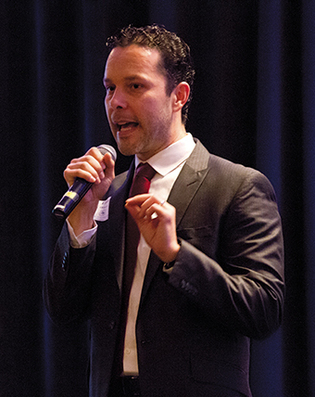 loading
loading
Where They Are NowLostA Law School alum takes on family separations at the border. Dylan Walsh ’11MEM is a freelance writer based in Chicago who covers science and criminal justice.  Courtesy Texas Civil Rights ProjectEfrén Olivares ’08JD and his staff at the Texas Civil Rights Project work with local and national groups to reunite families separated at the border. View full imageThe kinds of projects Efrén Olivares ’08JD takes on at the Texas Civil Rights Project are not run-of-the-mill legal work. He represents low-income landowners who could lose their homes to the border wall. He investigates the indiscriminate collection of immigrants’ DNA. And lately, he’s been consumed by the problem of children taken from their families. When Olivares and his staff in McAllen, Texas, first heard of the separations, they assumed immigration officials were keeping careful lists. But when they arrived at court, they found recordkeeping was up to them. TCRP counted 382 separated families in the summer of 2018—and eventually reunited most of them. From July 2018 through May 2019, they recorded over 450 more. TCRP has five offices, some two dozen full-time staff, and several law fellows. They coordinate with other organizations to track and reunite families. Yale Alumni Magazine: In May of 2018 you started interviewing parents in federal court in McAllen who had been separated from their children when crossing the border. What was that first day like? Efrén Olivares: The first day I went to court the parents were asking when they were going to see their children again. The judge didn’t know, the prosecutors didn’t know, the public defenders didn’t know, the border patrol agents didn’t know. No one had any answers for these parents as to where their children were or what conditions they were being held in or when they were going to see them again. Y: An executive order, then a federal injunction, were supposed to put an end to family separation. What are the results? O: Here in McAllen we still see separations. There are a couple of reasons this happens. The most common one is that the border patrol agent doesn’t believe that this is the parent. In many instances it’s an incorrect hunch, and they wrongfully separate families. Y: Is there any accountability? O: There is zero accountability for wrongful separations. It’s so easy for a federal agent to question parentage and then separate a family, especially when it’s an indigenous asylum seeker who doesn’t speak Spanish. We’ve had at least two cases in which failures to get an interpreter resulted in a separation. Y: Did your time at Yale contribute to this work? O: It’s been remarkable to connect the dots, in retrospect. At the Lowenstein International Human Rights Clinic I was exposed to the Inter-American Commission on Human Rights. Then, on a Bernstein Fellowship, I worked at the commission. Now I’m able to use that experience to bring families back together. Y: You said there are a couple of reasons that separation happens. One is a border agent’s hunch. There are also cases where a legal guardian who’s not a parent is separated from a child. Is that still going on? O: Those are going on every day in McAllen. We also see cases in which a parent’s minor criminal conviction from 20 years ago is grounds for separation. Y: Those cases are not protected by the executive order or injunction? O: Unfortunately, no. This problem is around because the administration’s policy of zero tolerance is around. That policy is what leads to the criminalization of immigrants and asylum seekers. It would be easy for the administration to rescind that policy. It takes a one-line memo signed by the attorney general. Y: Has the government made any effort to soften its stance? O: Not at all. They claim that the number of separations is back to “normal levels.” What consolation is that to a separated mother or father? Am I going to tell that to the parents I interview? Y: You’re a father. Has this affected you personally? O: It didn’t right off the bat. But halfway through summer my son, who was one and a half, started going to daycare. When my wife dropped him off the first day, she had to return within an hour because he wouldn’t stop crying. That brought it home—thinking of these parents in detention centers for days, weeks, months, not knowing what condition their children are in. Sometimes we try to facilitate a phone call between the parent and child. After that I ask, “Were you able to talk to your daughter?” Parents say, “Well, we tried, but for the five minutes we were allowed on the phone she wouldn’t stop crying. Mommy, why did you leave me? Why won’t you come and get me?”
The comment period has expired.
|
|